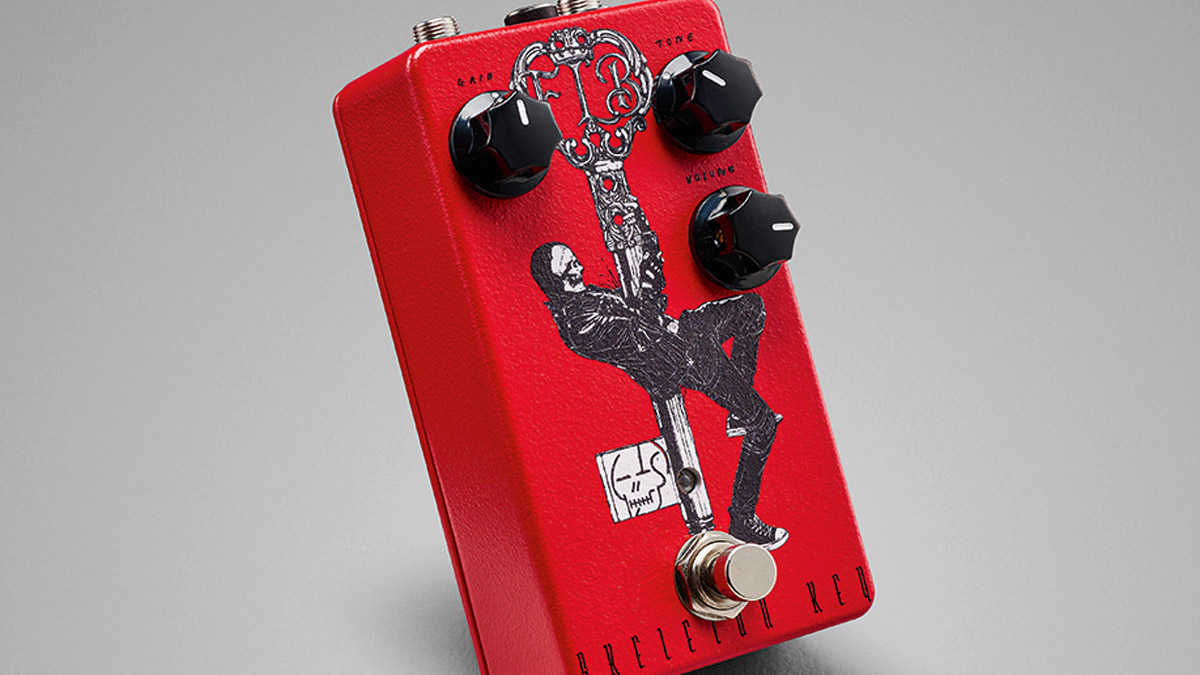MusicRadar Verdict
The Skeleton Key does as promised and can the door to some convincing QOTSA tones, particularly when pushing an overdriven amp further or stacked with other gain pedals, but its not just for Queens fans. This is an articulate dirt box that could be a pedalboard weapon so long as you can resist telling people all about it.
Pros
- +
The Queens tones are convincing
- +
Stacks well
- +
Responds well to picking dynamics and your volume control
Cons
- -
Some might want more gain
- -
Initial batches sold out so you might have to wait for one
MusicRadar's got your back
Funny Little Boxes Skeleton Key: What is it?
Everyone wants to sound like Queens Of The Stone Age and yet we all know that even in the maximum transparence of our digital media age this reference-quality electric guitar tone is still out of reach, and as such is subject to all kinds of hugger-mugger, myth and conjecture.
Every now and then tone sharks catch the scent of some chum in the water. That’s why you’ll find people talking more favourably about the Peavey Decade these days, and a hot trade in solid-state Peavey practice amps on the second-hand market in the hope that their transistorised circuit had the necessary gain mojo.
What if one pedal changed all that? And no, it’s not an amp modeller. It’s not even digital at all. That would be something – and that’s exactly the claim that Funny Little Boxes makes of its latest pedal, the Skeleton Key, a distortion pedal that unlocks the door to the rhythm and lead tones of Josh Homme, Troy Van Leeuwen, and Dean Fertita on the occasions when he swaps keys for strings.
Can the secret really be a compact drive pedal with just three controls, Volume, Gain and Tone, and not only that, one that retails for 99 bucks?
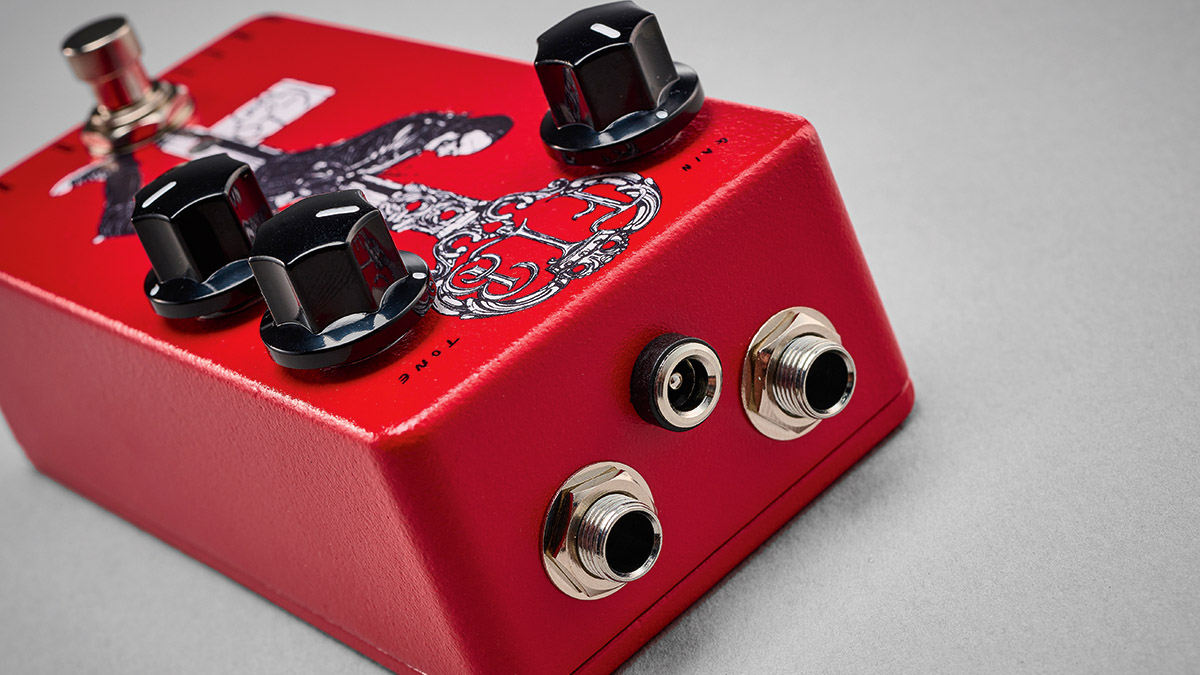
Even Queens are intrigued. When MusicRadar spoke to Troy Van Leeuwen last month he admitted that he had heard of the Skeleton Key and was keen to give it a try.
“It’s funny you bring up that pedal,” he said. “Somebody told me about that, under the same circumstances, ‘This is supposed to be the way you get the Queens tone.’ Like, ‘That’s cute!’ But I would love to try it just because we all collect tons and tons of pedals. I mean, seeing our band live, you can see on the floor how many pedals that me and Josh alone. It’s like a mini Guitar Center.”
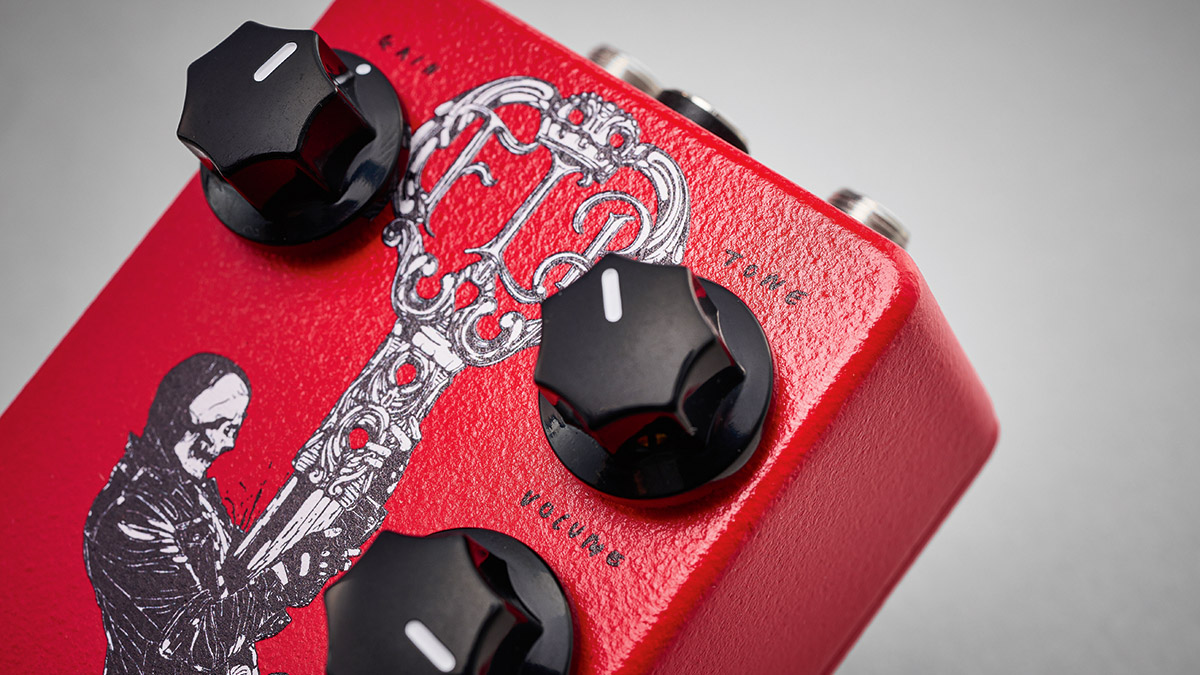
And we were intrigued, too. The thing question is what kind of QOTSA tones are we after. Sure, as soon as you hear a track you know its Queens, you recognise that guitar, but the tone changes all the time.
Want all the hottest music and gear news, reviews, deals, features and more, direct to your inbox? Sign up here.
It can be with single-coils and all wiry and scratchy. It can be woolier, fuzzier, big and wide. And that's before modulation and echo do their thing. The Skeleton Key, developed in partnership with Matt Webster of the YouTube channel Let’s Play All, is designed to be the pedal that gets you the ore tones, the quintessence of their sound, and from Webster’s impressive demo [see Hands-on Videos] it sure sounds promising.
Funny Little Boxes Skeleton Key: Performance and verdict
The first thing to note is that the Skeleton Key is not an official QOTSA tie-in or anything like that but it does look like one, with the enclosure illustration courtesy of Boneface, the artist that Homme emails whenever he needs some album art. Look closer and you’ll notice another neat touch; the descriptions under the control knobs are displayed in Boneface’s handwriting.
Speaking of which, the straightforward three-dial format of the Skeleton Key is very much welcome. There is a plug in and play quality to it, with top-mounted jacks and a compact form factor that make it easy to find space for on your pedalboard. And that’s just as well, because to really get the best out of this op-amp based distortion circuit you will want to pair it with other drives and/or fuzz pedals.
We started from a point of complete innocence, which is to say sparkling clean tube amp combo tone, a Fender Telecaster and the Skeleton Key, and stepping on it wasn’t this transformative Wizard Of Oz experience where we were spirited away to some Palm Desert rehearsal room just off the Interstate 10.
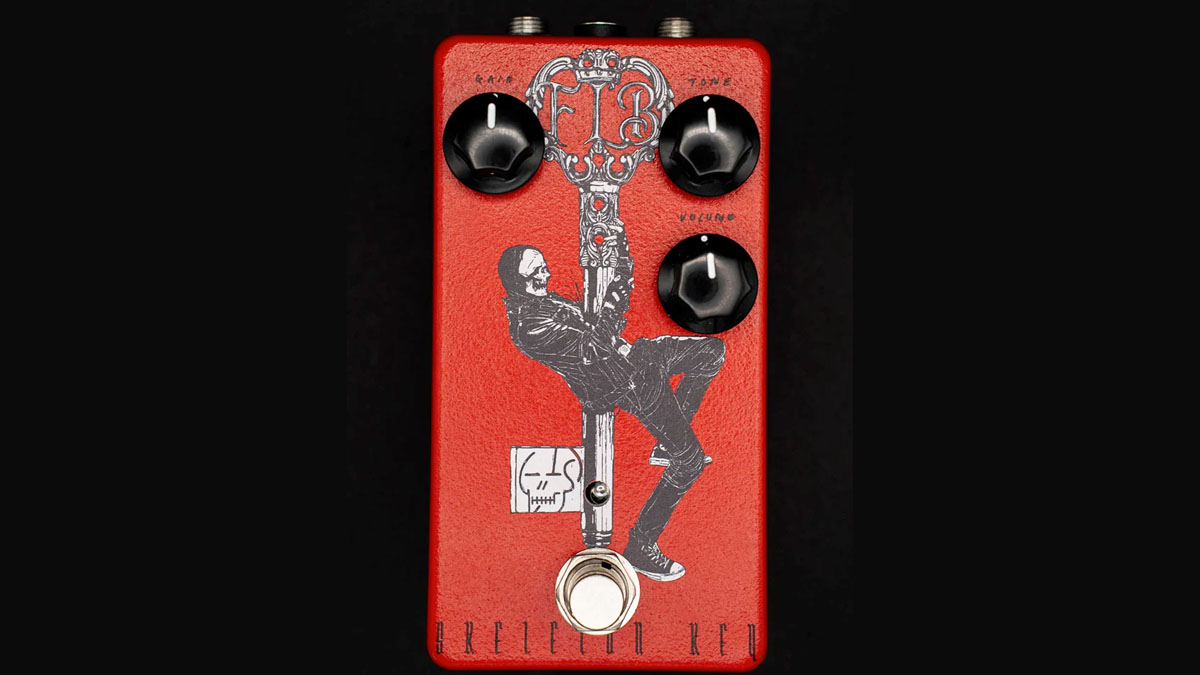
What it did to was reveal that the Skeleton Key is not a gain monster under its own steam, but that its Volume control is packing a lot of gain to push your amp, the Tone has a lot of range, and each of these controls interact nicely to get a lot of musical textures. With the Tele, there was a lot of scratchy, wiry tones that work well for blues and garage rock alike.
When you dial in the amp to the edge or just beyond breakup, however, that’s when the magic starts, and when you start to get that Queens vibe going. On single-coils, we liked rolling that Tone control back a bit, diming the gain and keeping the Volume at or just beyond unity gain. There’s a lo-fi hard clipping voice to it that’s just begging for an overdriven bass guitar underneath, and drummer that can hit them.
Tuning down yields more dramatic results. Stacking the Skeleton Key with another drive pedal – in this case a Fulltone OCD Germanium – was a lot of fun, with the Skeleton Key’s textures complementing the OCD nicely.
Add a bit of compression for more sustain and flick to the neck pickup and there’s some very cool sounds that have the whiff of Homme/TVL about them but, equally, and this is important for any pedal, have a sound that makes you want to explore your own ideas, too. After all, one of the beguiling qualities of QOTSA guitar tone is that Mona Lisa quality, that you can interpret it as you see fit.
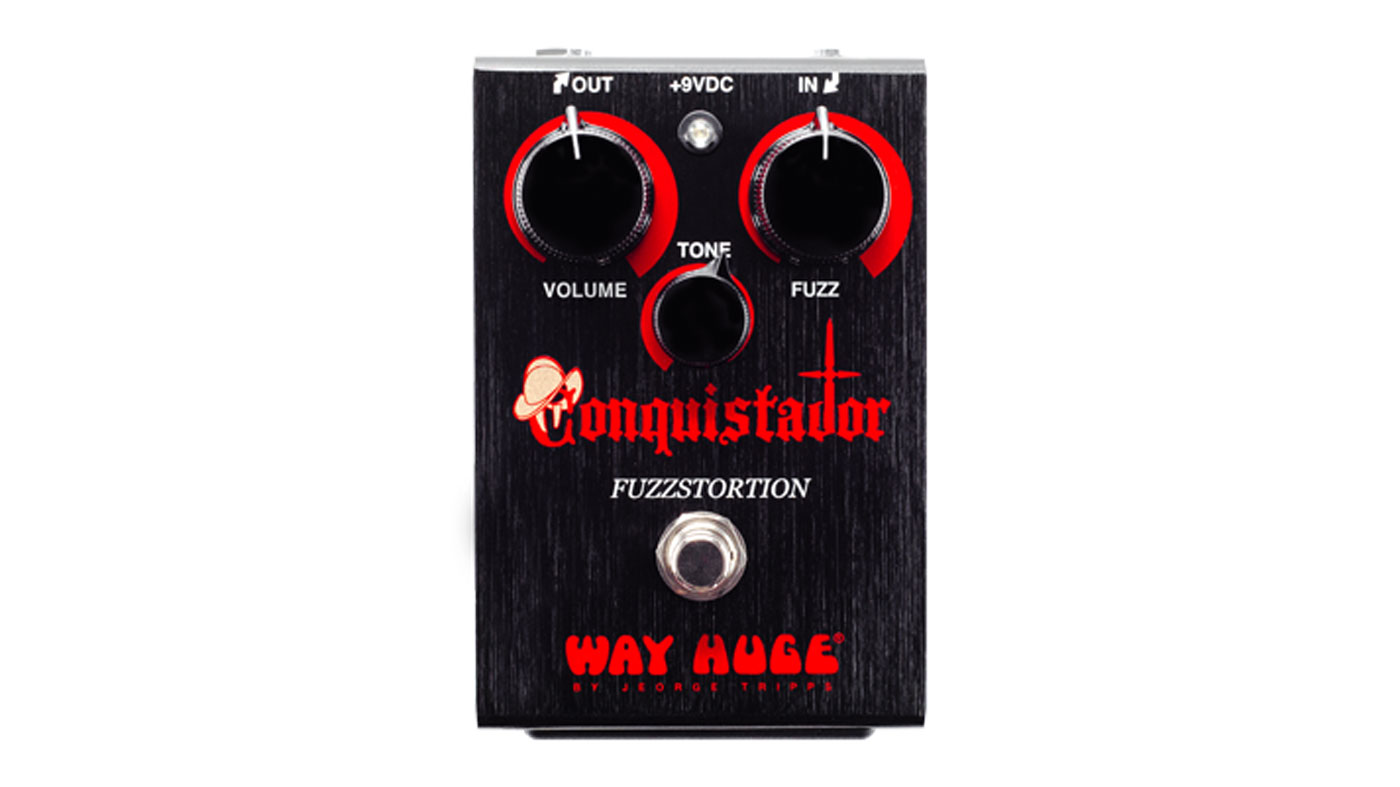
• Way Huge Fuzzstortion
When Reverb paired this with a Daredevils Effects Atomic Cock cocked-wah emulator Van Leeuwen was suitably impressed, and the unruly fuzz is definitely a fun one to audition when putting together a desert sessions 'board.
• Funny Little Boxes 1991
Another ambitious dirt pedal from FLB, this promises the guitar tones of Pearl Jam's Ten in one stompbox, offering an amp-like response and control setup to dial in your sound.
What you as a player bring to the party is of course everything. What the Skeleton Key does is something all right. It’s not tb – that’s been done and this ain’t that. It’s an op-amp distortion voiced like an unruly overdrive and that gives it a sort of upscale pawnshop guitar drive tone.
It sounds even better with a humbucker-equipped guitar, the extra output of our hot PAF-alike gives you the extra crunch you need. That’s the thing about this Skeleton Key; it’s a dynamic pedal, the more you feed it, the more it responds, so dig in and hit those chords harder and you get more gain.
That it isn’t a fire-breather in the gain department might momentarily disappoint you until you realise that QOTSA tone is often way cleaner than you might think – volume is always your friend when playing their material – and the Skeleton Key gives you the character while retaining all that note separation and dynamics. There’s only one problem. Now Funny Little Boxes has given us a pedal to get us in the game, now we’ve got to play like Homme et al and that’s harder than it looks. Way harder.
MusicRadar verdict: The Skeleton Key does as promised and can the door to some convincing QOTSA tones, particularly when pushing an overdriven amp further or stacked with other gain pedals, but its not just for Queens fans. This is an articulate dirt box that could be a pedalboard weapon so long as you can resist telling people all about it.
Funny Little Boxes Skeleton Key: The Web Says
"We fed the Skeleton Key humbucker pickups and single coils, with our guitars tuned to C standard, drop C and standard tuning, and the results are oddly uncanny. Crucial to the Skeleton Key’s sound is its gain range, which, while labelled distortion is closer in terms of saturation levels to a heavy overdrive."
Total Guitar
Funny Little Boxes Skeleton Key: Hands-on Videos
Let's Play All
Mine Like Me
Funny Little Boxes Skeleton Key: Specifications
- ORIGIN: UK
- TYPE: Distortion pedal
- CONTROLS: Gain, Tone, Volume
- CONNECTIONS: Standard input, standard output
- POWER: 9V DC adaptor (not supplied)
- CONTACT: Funny Little Boxes
Jonathan Horsley has been writing about guitars and guitar culture since 2005, playing them since 1990, and regularly contributes to MusicRadar, Total Guitar and Guitar World. He uses Jazz III nylon picks, 10s during the week, 9s at the weekend, and shamefully still struggles with rhythm figure one of Van Halen’s Panama.
